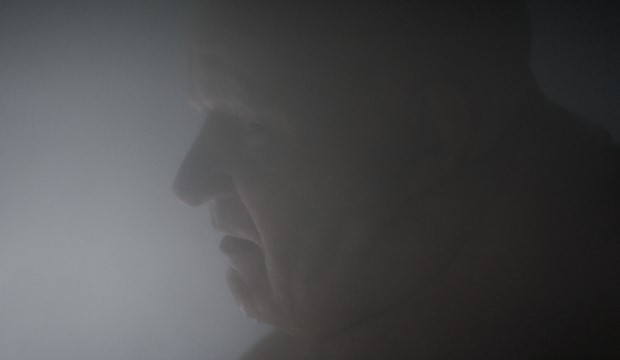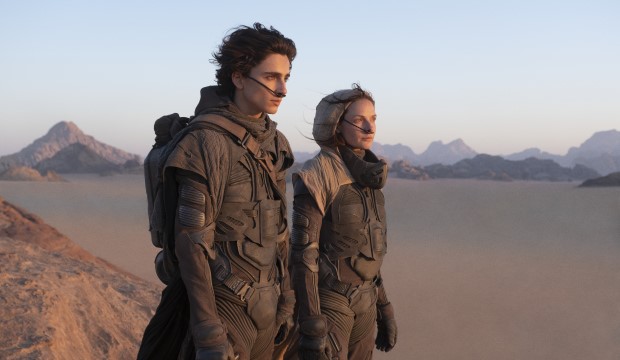Dune (2021) review ★★★★★
Denis Villeneuve is back with his most ambitious project yet: adapting Frank Herbert's famously complex sci-fi novel. Stars Timothée Chalamet, Oscar Isaac, Zendaya and Stellan Skarsgård
Timothée Chalamet in Dune (2021). Photo: Warner Bros.
If there was any
filmmaker alive today who seems destined to adapt Frank Herbert's Dune – the
intricate, frustrating, and apparently unfilmable sci-fi novel from 1965 – it’s
Denis Villeneuve.
The novel famously defeated the surrealist filmmakers David Lynch and Alejandro Jodorowsky. But Villeneuve has a unique talent for navigating mainstream requirements, while putting his own stamp upon them. After making Arrival and Blade Runner 2049, he's demonstrated a masterful grip of the genre as well as a level of aesthetic precision unusual in a factorial cinema landscape. The pressure's on for Dune, then. The vital question: is it actually good?
Experientially, yes. The genius of late-career Villeneuve is his uncanny, supernatural ability to balance the delicate and the stupendous. Dune pushes that dynamic to its ultimate potential.

Stellan Skarsgård as the unambiguously evil Baron Harkonnen. Photo: Warner Bros.
The first shot is a towering sand dune on the desert planet Arrakis, a vast pillar among acres of deep, beige nothingness. A tough wind passes, revealing sparkling dots among the grains of sand. Those glimmers are specs of Spice, the most valuable resource in the surrounding galactic empire. You cross from stupendous to delicate to stupendous again.
This works with the prestigious political systems that govern this corner of the universe, where Arrakis is at the centre of an interplanetary schism. Arrakis was initially ruled over by the brutal regime of the Harkonnens, led by a grotesquely evil Baron. The unambiguous supervillain is played by a bald, brooding and horrendously overweight Stellan Skarsgård, who resembles a similarly shadowed Marlon Brando in Apocalypse Now.
Baron Harkonnen oppressed the Arrakis natives, the sapphire-eyed Fremen, as a brutal colonial power. Actor/musician Zendaya stars as Chani, a Fremen who introduces her people's struggles in the film’s riveting, anti-colonialist prologue.
But by Imperial decree, Arrakis is handed over to House Atreides from planet Caladan, led by Duke Leto (Oscar Isaac). Leto’s son, the mundanely named Paul (Timothée Chalamet), is the reluctant hero of this vast tale: heir to the throne as well as a potential mystic. He’s mentored by his mother Lady Jessica (a stern but maternal Rebecca Ferguson), who’s in a guild of witches called the Bene Gesserit.

Timothée Chalamet and Rebecca Ferguson as Paul Atreides and Lady Jessica. Photo: Warner Bros.
Yep, it’s a lot – and that barely scratches the surface. But with co-writers Jon Spaihts (Passengers) and Eric Roth (A Star is Born), Villeneuve guides you through these labyrinthian plots and difficult contexts. And although the heavy exposition can be tough to wade through, it’s written with precise and curious detail.
And if it is too much, you need only blink before Villeneuve accelerates into another scene of such astounding and unpredictable beauty. Every shot in Greig Fraser’s eclectic visual palette is a surreal surprise, warping into impossible spaceships and wonderfully weird costume designs by Jacqueline West. And then there’s the legendary composer Hans Zimmer, supplying all those lively visuals with a brilliant booming score that embraces a searingly primal edge.
The story that tunnels through those qualities isn't perfect, but that’s largely the fault of the source material. Paul Atreides is a typical ‘chosen one’ character, and his messianic destiny leaves little room for potential conflict. He’s also able to visualise the future, which epically intrudes upon the action of the present – even seeming, at times, to be an elaborate trailer for the planned Dune: Part Two.
Aside from the plight against colonial forces, there’s little emotional connection to the characters. The connection forms instead with the mesmerising worlds that Dune builds with Herbert’s blueprints, treated with the IMAX severity the genre demands. The film doesn’t exceed all of its impossible expectations, but it’s an overwhelming spectacle. And like the gargantuan sandworms that swim in the sands of Arrakis, Dune wields the power to make you tremble, suck you in, and chew you up.
Dune will be in UK cinemas on Thursday 21 October.
The novel famously defeated the surrealist filmmakers David Lynch and Alejandro Jodorowsky. But Villeneuve has a unique talent for navigating mainstream requirements, while putting his own stamp upon them. After making Arrival and Blade Runner 2049, he's demonstrated a masterful grip of the genre as well as a level of aesthetic precision unusual in a factorial cinema landscape. The pressure's on for Dune, then. The vital question: is it actually good?
Experientially, yes. The genius of late-career Villeneuve is his uncanny, supernatural ability to balance the delicate and the stupendous. Dune pushes that dynamic to its ultimate potential.

Stellan Skarsgård as the unambiguously evil Baron Harkonnen. Photo: Warner Bros.
The first shot is a towering sand dune on the desert planet Arrakis, a vast pillar among acres of deep, beige nothingness. A tough wind passes, revealing sparkling dots among the grains of sand. Those glimmers are specs of Spice, the most valuable resource in the surrounding galactic empire. You cross from stupendous to delicate to stupendous again.
This works with the prestigious political systems that govern this corner of the universe, where Arrakis is at the centre of an interplanetary schism. Arrakis was initially ruled over by the brutal regime of the Harkonnens, led by a grotesquely evil Baron. The unambiguous supervillain is played by a bald, brooding and horrendously overweight Stellan Skarsgård, who resembles a similarly shadowed Marlon Brando in Apocalypse Now.
Baron Harkonnen oppressed the Arrakis natives, the sapphire-eyed Fremen, as a brutal colonial power. Actor/musician Zendaya stars as Chani, a Fremen who introduces her people's struggles in the film’s riveting, anti-colonialist prologue.
But by Imperial decree, Arrakis is handed over to House Atreides from planet Caladan, led by Duke Leto (Oscar Isaac). Leto’s son, the mundanely named Paul (Timothée Chalamet), is the reluctant hero of this vast tale: heir to the throne as well as a potential mystic. He’s mentored by his mother Lady Jessica (a stern but maternal Rebecca Ferguson), who’s in a guild of witches called the Bene Gesserit.

Timothée Chalamet and Rebecca Ferguson as Paul Atreides and Lady Jessica. Photo: Warner Bros.
Yep, it’s a lot – and that barely scratches the surface. But with co-writers Jon Spaihts (Passengers) and Eric Roth (A Star is Born), Villeneuve guides you through these labyrinthian plots and difficult contexts. And although the heavy exposition can be tough to wade through, it’s written with precise and curious detail.
And if it is too much, you need only blink before Villeneuve accelerates into another scene of such astounding and unpredictable beauty. Every shot in Greig Fraser’s eclectic visual palette is a surreal surprise, warping into impossible spaceships and wonderfully weird costume designs by Jacqueline West. And then there’s the legendary composer Hans Zimmer, supplying all those lively visuals with a brilliant booming score that embraces a searingly primal edge.
The story that tunnels through those qualities isn't perfect, but that’s largely the fault of the source material. Paul Atreides is a typical ‘chosen one’ character, and his messianic destiny leaves little room for potential conflict. He’s also able to visualise the future, which epically intrudes upon the action of the present – even seeming, at times, to be an elaborate trailer for the planned Dune: Part Two.
Aside from the plight against colonial forces, there’s little emotional connection to the characters. The connection forms instead with the mesmerising worlds that Dune builds with Herbert’s blueprints, treated with the IMAX severity the genre demands. The film doesn’t exceed all of its impossible expectations, but it’s an overwhelming spectacle. And like the gargantuan sandworms that swim in the sands of Arrakis, Dune wields the power to make you tremble, suck you in, and chew you up.
Dune will be in UK cinemas on Thursday 21 October.
TRY CULTURE WHISPER
Receive free tickets & insider tips to unlock the best of London — direct to your inbox
| What | Dune (2021) review |
| When |
21 Oct 21 – 21 Oct 22, IN CINEMAS |
| Price | £determined by cinema |
| Website | Click here for more information |